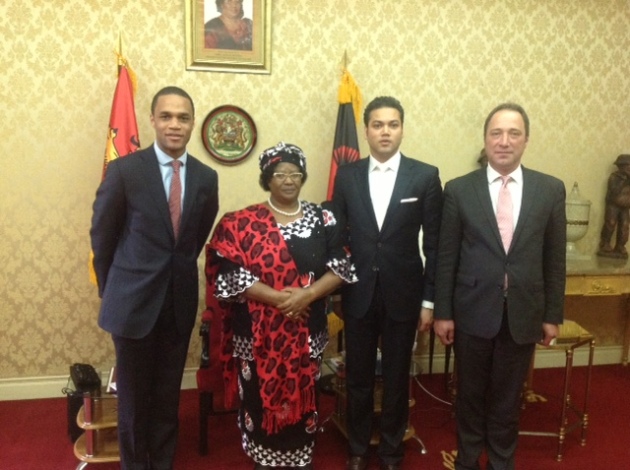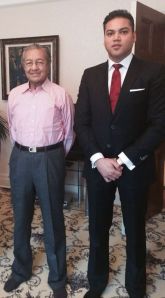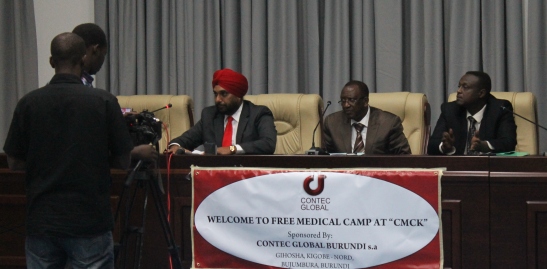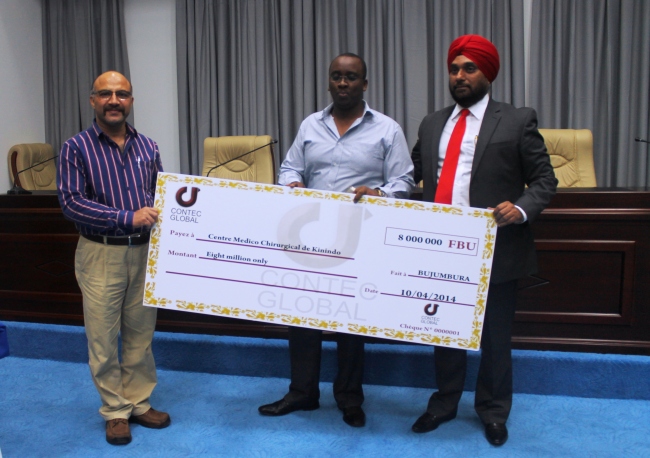Contec Global, under leadership of Roheen Berry, organised free medical camps in Burundi
Roheen Berry’s Vision
The Next Ten Years
Roheen has clear objectives for the next ten years. Indeed these are in many ways an example of his far-sighted awareness of the classic challenges facing a successful and growing privately owned family business.
Specifically, these are as follows:
The bedding down of the business expansion projects mentioned previously in particular the new visa project in Nigeria and the expansion into East Africa
Diversifying the business more fully into infrastructure, downstream oil and gas and hospitality operations
The re-structuring of the business accordingly into recognisable divisions and the hiring of internationally recognised top talent to lead those divisions
Parallel re-structuring of the business at the share ownership level to protect the family’s long term interests
The long term equitable separation of the family ownership and non-family business management interest involving the establishment of a dedicated family office
Engagement with London based international private equity financial institutions for the provision of further expansion capital and a possible long term partial flotation on the public market
About Roheen Berry
Education
Roheen Berry was educated at Sherwood College in India and the Kennedy School, Harvard. Growing up in the UK, Nigeria and India, he joined the family business, Contec Global, in 2009, following a period of employment at the Wellington Investment Management group. Contec Global is a diversified business operating out of India, Dubai and West and Central Africa, primarily but not exclusively specialising in the provision of secure document solutions to governments. These solutions embrace anything from passports, ID cards, driving licences to land title deeds based on the latest biometric technology and underpinned by the collation, maintenance and secure storage of underlying data.
Joining the Family Business
Between 2009 and 2012, he was instrumental in marketing the group within Africa outside its host country, Nigeria, engaging with senior politicians, civil servants and heads of state. During this period, he was particularly adept at visiting frontier market countries in West Africa such as Gambia, Niger, Burkina Faso, Guinea, Burundi and South Sudan winning substantial contracts for the firm in Niger, Burundi and South Sudan.
Building on his experiences growing up in Africa, he was able to display an acute knowledge of the difficulties facing emerging market governments in handling issues relating to security documentation and border security, as well as a sympathetic understanding of the cultural sensitivities needed to confer and negotiate with senior figures in African political life.
A key driver in the success of this period was his development of a BOOT (build, own, operate and transfer) business model of public/private partnership that appealed to governments desperately short of public finance and revenue to pay for necessary infrastructure projects. Through this model, he offered to self-finance the IT projects he was marketing to governments, recouping the initial investment through the share of revenue generated by the sale of documents to the general public. In this way, governments were able to access some of the most up to date security technology available globally while at the same time enjoy additional sources of revenue. A prime example of this was the Burundi passport (introduced in 2010) which was awarded most advanced of all East African passports in 2012.
Appointment as Managing Director
Following his success in growing the business during this period, Roheen was appointed Managing Director of Contec Global in 2012 as his father stepped up to Chairman, delegating more of the day to day running of the business to his son. Since his appointment, Roheen has been instrumental in expanding the secure document business into East Africa (Malawi and Kenya) and West Africa (into Sierra Leone), while at the same time looking at new opportunities to diversify the group into downstream oil and gas, infrastructure, and hospitality management.
Opening of Dubai and London offices
A key development was the opening of a Dubai office in 2012 with a brief to develop applications for the mobile telephone market. The long term objective of this unit is to develop products to take advantage of the burgeoning smart telephone market in Africa and the rise of middle class spending power in a less developed retail environment than that available in western and Middle East markets He also opened a representative office in London to engage with financial organisations in the City of London ahead of a new period of anticipated growth for the business.
In 2013, the firm won a new contract to streamline and update the visa system for business and tourist visitors to Nigeria. This contract is designed to run alongside the existing CERPAC expatriate identity card provision which has been ongoing since 1999. During his period with the business, Roheen has developed a deep knowledge of the security document industry, in particular the technology underpinning it and relationships with a number of global hardware and software providers.
He is a regular attendee and contributor at industry conferences and seminars around the world.
Contec Global organised Free Medical Camps
We recently organised a Free Medical Camp at Bujumbura as a part of Contec Global’s CSR initiatives. The one at CMCK clinic in Bujumbura was amongst the many camps organised across the city in the past and treated more than 160 patients over two days.
We have particularly focussed in the area of sports and have been regularly sponsoring events organised by AMABU (Sports Committee of Bujumbura).
Through efforts over the past three years, we have identified a brilliant runner- Francine Niyonsaba who participated in Finals of London Olympics in 800 Meters category.
Moreover, Contect Global for the past many years has sponsored “Inter Police” Volley Ball and Foot Ball tournaments in the capital of Burundi.
Roheen Berry and Contec Global
Headed by Roheen Berry, Contec Global has hardcore expertise of working on large-scale security solutions projects, as well as our laterally integrated business interests, puts us in a unique position to provide seamless, end-to-end solutions for mega projects. With worldwide presence and close associations with the governments of nations at the very highest levels, Contec Global is uniquely positioned to not just initiate and implement mega projects but to also influence policy makers on key issues.
The Group has vast experience in Africa, which continues to be our primary market, with mission critical, large-scale operations spanning the continent from Nigeria to Uganda, the Republic of Niger, Burundi, Congo DRC and Southern Sudan. In the year 2008 however, we are looking to aggressively build our presence in the European market through our operations in the United Kingdom and Switzerland, as well as in the Middle East through our newly forged network of partnerships and strategic alliances.
Connect Global’s main scope of work in the energy market, including alternative energies, extends across genres and beyond geographical and political borders to form our core focus area for the year 2008. Wide experience in implementing large-scale projects and presence and standing in nations spanning the globe make us confident of achieving uncommon results and rapid progress in the alternative energies market at all levels in the coming years. Now a days that group started to explore the following areas and fields also
Roheen Berry in platform e-Governance and smart technologies
Roheen Berry is the Managing Director of Contec Global. He was educated at Harvard University and has been instrumental in expanding the Group’s activities beyond Nigeria into other African countries, as well as developing a niche IT hub in Dubai and broadening the operating base of the Group as a whole. Roheen splits his time between Africa and the UK.
Established in 1984 and headquartered in London, the Contec Global Group has a presence in Europe, Asia and Africa. As a company established on the platform of e-Governance and smart technologies, Contec Global is amongst the most experienced independent technology and systems organisations operating in developing countries. Today, the Group is engaged globally in providing integrated system based solutions in the fields of secure technologies and mobile telephones and project management programmes in the fields of energy, infrastructure and hospitality.
Celebrations, the Goan way
It’s said that there’s no better place to be on New Year’s Eve than Goa. And the celebrations at the recently opened Praia Resort and Club in Goa proved just that.The view from the resort was enchanting with Panaji promenade on one side and Fort Aguada on the other. “Praia means beach in Portuguese,” said Roheen and Sahir Berry, hosts and brothers. Vivek Oberoi, who was club hopping, also stopped by here. The guests enjoyed a lavish spread of Indian, French, Italian and Lebanese cuisine. Also, keeping them entertained was a breathtaking fire show.
Technology can open borders to business and tourism in Africa and create millions of jobs – By Dr. Benoy Berry and Roheen Berry
Intra-African trade accounts for just 12% of the continent’s total trade, presenting a huge opportunity for growth. The latest figures show that if African countries increased the trade between them by only five per cent it would create $34 billion dollars of extra revenue year on year.
The impediments to African growth have been discussed ad nauseam. While the focus has traditionally been on high tariff barriers other major problems are moving up the agenda. The Deputy Director- General of the WTO Valentine Rugwabiza recently said: “It is essential for African countries to increase investment in trade-related infrastructure and other trade facilitation measures to reduce red tape, transaction costs and expedite the movement of goods, services and people across borders.”
Yet, the problems appear insurmountable. According to data
from the African Union, at present it requires an average of 1,600 documents per truck to cross a border within the continent. The movement of people across borders is cripplingly low; fewer residents cross the border between Kinshasa and Brazzaville now than crossed the Berlin Wall in Germany in 1988, the year before it fell.
Today, cross-border travel is difficult, and this hinders the movement of business and tourist travelers, which in turn is holding back intra-African trade. The US based Brookings Institute has described the obstacles to cross-border travel in Africa in shocking terms; extortion, abuse and local law enforcement all hold up or deter business and tourist travelers.
For the sake of future generations of West Africans, you cannot afford to fail
Tourism development is an excellent indicator of the success of such schemes: for every 36 new tourists in any given destination, one new job is created. In G20 countries visa facilitation has historically increased international tourist arrivals by 5-25% following the implementation of policy changes (according to a study by Tourism Economics for the UN). The actual gain depends largely on the specific visa facilitation actions taken and the markets affected.
Given the clear benefits to Africans, it is difficult to understand why visa facilitation measures have taken so long to be introduced. Cost can be an issue, as can the capacity of public sector organisations to develop and implement e-visa programmes.
Think-tanks have suggested solutions. As the Brookings Institute has said, one way to encourage the members of the Regional Economic Communities to open up their borders uniformly would be to replace the revenue that was created previously by visa fees. This requires private sector involvement and financing: African companies must step up.
The Speaker of the Ghanaian Parliament recently said that unless they create a free trade area that unleashes Africa’s full economic potential the Government and the private sector in West Africa will be held to account by Africa’s people. In a speech addressed to the negotiators of the trade deal she said: “For the sake of future generations of West Africans, you cannot afford to fail.”
The challenge is clear; to invest in trade-related infrastructure which can unlock Africa’s potential. The extra trade generated by just five per cent more trade within the continent amounts to the cost of 425,000 schools per year in Nigeria, 1.48 million new libraries per year in Malawi, or 3.4 million nurses for 10 years in Cameroon. This level of increased trade far exceeds the level of aid promised to Africa at the Gleneagles Summit of the G8 countries in 2006.


